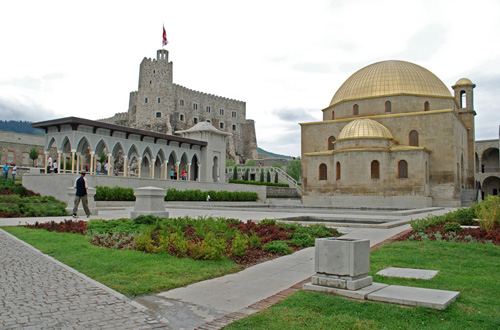| Saakashvili Slams Parts of Govt's Planned Deal with Turkey on Cultural Heritage |
| Civil Georgia, Tbilisi / 2 Apr.'13 / 20:53 |

Mosque in Rabati, old part of Akhaltsikhe town, which was renovated together with the entire complex last year. Photo: Civil.ge
President Saakashvili has weighed in government’s ongoing negotiations with Turkey on cultural heritage issue by blasting proposed plan to reface some of the elements of already restored Rabati complex in Akhaltsikhe, town in Samtskhe-Javakheti region.
An old part of Akhaltsikhe, known as Rabati, has undergone large-scale renovation last year, overseen by then interior minister Vano Merabishvili, and was opened to visitors in August, 2012.
The complex with its multicultural architecture, citadel, castle and other facilities, stretched on a rocky hill overlooking Akhaltsikhe, also includes a 18th century Ahmadiyya Mosque, which has also been restored but is not used for religious services.
The current government, however, says that “hasty” restoration of the complex was done by ignoring principles of preservation of cultural heritage and some of its elements, among them the mosque and madrasa, now required to be “rectified”. According to the Ministry of Culture redressing parts of the complex was also a request of the Turkish side.
Yet to be signed agreement with Turkey on cooperation in the sphere of cultural heritage also addresses issues related to restoration of the Georgian Orthodox Churches – Ishkhani and Oshki, now located in north-east Turkey, as well as possible construction of a new mosque in Batumi.
On April 2 President’s administration released parts of a draft agreement currently negotiated by the Georgian government with Turkey.
Among changes, proposed to be introduced in the complex, is replacement of current gold colored dome of the mosque with lead color dome and removing from within the mosque stone steles with engraved crosses. The proposal also includes a commitment to examine drainage systems of the facilities in the complex and if needed improvement of facing materials.
President’s administration said that removing of symbols of Christianity and “destruction” of mosque’s dome was completely unacceptable; it also said that these proposals were not the demand of Turkey, but a result of “misunderstanding” caused by the Georgian government, which President Saakashvili would try to clarify when he visits Turkey in coming days.
“We think that it would actually amount to destroying the Rabati fortress, which represents one of the major cultural and tourist destinations on this territory… We do not think that it’s a demand or an intention of the Turkish side. It is a misunderstanding, caused by the Georgian government,” Manana Manjgaladze, president’s spokesperson, said.
“Removing of symbols of Christianity from the area and destroying of [mosque’s] dome, as it is noted in the document, is completely unacceptable and inadmissible.”
“We want good relations with Turkey… We were the initiators of restoration and protection of Turkish monuments on our territory, but Georgian government’s proposal is completely different – this is very dangerous and unacceptable for our country, which the Georgian President will never agree on,” she said.
“This document is about demolition and destruction. It is about removing Christian symbols, which require special care, like symbols of Islam, of course. This is not a Turkish-Georgian problem. This is a continuation of a trend which we see and hear recently – leveling to the ground and destroying everything that has been built in recent years,” President’s spokesperson said.
Deputy Minister of Culture, Marine Mizandari, dismissed allegations that the complex or part of the complex would be destroyed as “ludicrous”.
“On the contrary, we want to rectify those mistakes and shortcomings which were made in the process of restoration; keeping of these shortcomings will be incompatible with preservation of historical heritage,” Mizandari said, adding that “standards and methodology” of restoration of historical monument were violated because Rabati renovation works were carried out “hastily” and “thoughtlessly”.
She also said that removing of stone steles with engraved crosses was a request of the Turkish side and representatives from the Georgian Patriarchate did not seem to be against; she said that these steles would possibly be placed in a museum of Rabati complex.
